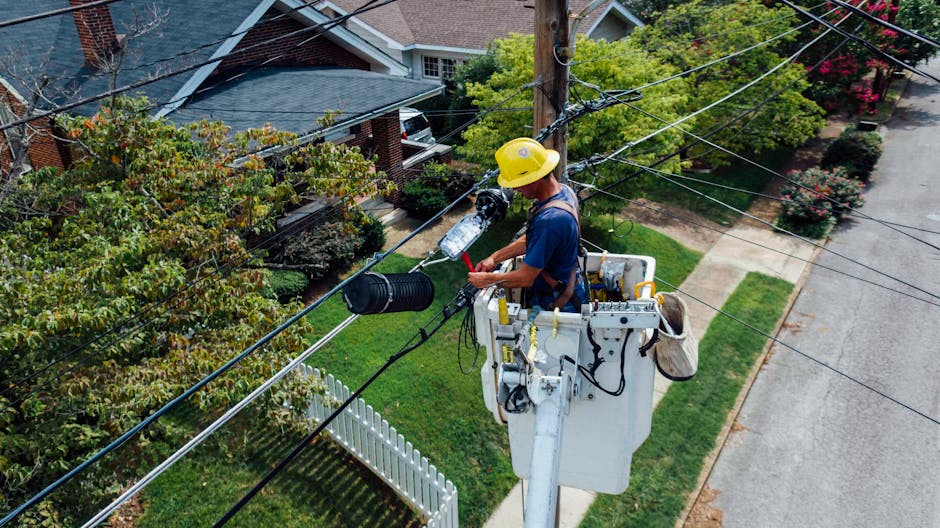Protecting Your Business: General Liability Insurance for Electrical Contractors

Understanding the importance of general liability insurance for electrical contractors is crucial for anyone in the trade. Here’s why:
Protects Against Financial Losses: Covers costs related to damages and legal fees.Mitigates Risks: Handles claims from third-party injuries or property damage.Compliance: Often a legal requirement for operating and securing contracts.Peace of Mind: Ensures business continuity despite unforeseen incidents.
As an electrical contractor, you know that working with electrical systems is high-risk. From accidental damage to a client’s property to injuries on the job, the potential for costly mishaps is significant. General liability insurance for electrical contractors shields your business from these financial setbacks, ensuring you can continue operations no matter what.
My name is Paul Schneider, and I own two independent insurance agencies in Florida specializing in comprehensive insurance solutions for businesses. With years of experience in insuring electrical contractors, I understand the unique risks and the necessity of tailored general liability insurance.

This guide will delve into why general liability insurance is vital, what it covers, and how to find the right policy to secure your electrical contracting business. Let’s get started with understanding what general liability insurance for electrical contractors is all about.
What is General Liability Insurance for Electrical Contractors?
General liability insurance for electrical contractors is a type of insurance that provides financial protection against common risks faced in the electrical trade. This includes coverage for bodily injury, property damage, and legal fees that may arise from accidents or mistakes on the job.
Definition and Coverage
General liability insurance is designed to protect electrical contractors from potentially devastating financial losses. It covers a range of incidents that can occur while performing electrical work. Here are the key components:
Bodily Injury
If someone gets hurt due to your electrical work, your general liability insurance can help cover medical expenses and legal fees. For example, if a client trips over a pile of wires you left out and injures their ankle, this insurance will cover the medical costs and any legal fees if you are sued.
Property Damage
Accidents happen, and sometimes they cause damage to someone else’s property. If you accidentally damage a client’s property while running conduit through their walls, general liability insurance will help pay for the repair or replacement costs.
Legal Fees
Lawsuits can be expensive. Your general liability insurance will cover the legal expenses if you are sued for damages or injuries caused by your work. This includes court costs, settlements, and defense fees.


Additional Coverage
General liability insurance can also include coverage for advertising injury, such as libel, slander, or false advertising claims. Additionally, it can cover immediate medical payments for injuries that occur on your job site, regardless of who is at fault.
In summary, general liability insurance for electrical contractors is essential for protecting your business from financial losses due to accidents, injuries, and property damage. It provides peace of mind and ensures that you can focus on your work without worrying about the potential costs of unexpected incidents.
Key Coverages in General Liability Insurance
Property Damage
Property damage coverage is crucial for electrical contractors. It helps cover the costs of repairing or replacing third-party property that gets damaged during your work. For instance, if you accidentally cause a fire while installing wiring, this coverage would help pay for the repairs.
Third-Party Property: Covers damage to property owned by others, such as clients or neighboring businesses.Repair Costs: Pays for the cost to fix damaged property.Replacement Costs: Covers the cost to replace items that are beyond repair.
Bodily Injury
Bodily injury coverage is another essential component. It helps pay for medical expenses and legal fees if someone gets hurt due to your work. For example, if a client trips over your equipment and breaks an ankle, this coverage would come into play.
Medical Expenses: Covers immediate medical costs, such as hospital bills and rehabilitation.Legal Defense: Pays for legal fees if you’re sued.Compensation: Provides compensation for lost wages if the injured party cannot work.
Legal Expenses
Legal expenses can quickly add up, especially if you’re facing a lawsuit. General liability insurance covers various legal costs, including court fees and settlements.
Lawsuits: Covers costs associated with defending against lawsuits.Settlements: Pays for any settlements you might need to agree to.Court Costs: Includes fees for filing documents, hiring expert witnesses, and other court-related expenses.
Advertising Injury
Advertising injury coverage protects you from claims related to your marketing activities. This includes libel, slander, and false advertising.
Libel: Covers written defamation claims.Slander: Covers spoken defamation claims.False Advertising: Protects against claims that you misrepresented your services or products.
Medical Payments
Medical payments coverage is designed to cover immediate medical costs for injuries that occur on your job site, regardless of who is at fault. This helps to quickly address minor injuries and prevent larger claims.
Immediate Medical Costs: Pays for emergency medical treatment.No-Fault Coverage: Provides quick payment for minor injuries without determining fault.


General liability insurance for electrical contractors is comprehensive, covering various risks that can arise in your line of work. By understanding these key coverages, you can ensure your business is well-protected.
Why Electrical Contractors Need General Liability Insurance
Electrical contractors face unique risks that can lead to significant financial losses. General liability insurance for electrical contractors is essential to safeguard your business from these threats.
Risk Factors in Electrical Work
Electrical work comes with inherent dangers. Here are some common risks:
Fire Hazards: Faulty wiring or electrical malfunctions can cause fires, leading to property damage and potential lawsuits.Electrical Shocks: Electricians work with live wires and high-voltage equipment, increasing the risk of electrical shocks and serious injuries.Equipment Damage: Tools and equipment can be damaged during use or transit, impacting your ability to complete jobs efficiently.
These risks make it crucial for electrical contractors to have robust insurance coverage to handle unexpected incidents.
Legal Requirements
State regulations often mandate specific types of insurance for electrical contractors. Here’s what you need to know:
State Regulations: Many states require electrical contractors to carry general liability insurance to operate legally. This ensures that you can cover any damages or injuries caused by your work.Licensing and Compliance: To obtain and maintain your electrical contractor license, you must comply with state insurance requirements. Failure to do so can result in fines or loss of your license.
Staying compliant with legal requirements not only protects your business but also builds trust with clients.
Financial Security
The financial impact of claims can be devastating. General liability insurance provides a safety net:
Cost of Claims: Legal fees, medical expenses, and repair costs can quickly add up. Insurance helps cover these expenses, protecting your business from financial strain.Business Continuity: Insurance ensures that your business can continue operating even after a significant claim. This helps maintain your revenue stream and customer base.Asset Protection: Your business assets, including tools, equipment, and vehicles, are valuable. Insurance helps protect these assets from loss or damage.
By securing financial stability, you can focus on growing your business without worrying about unexpected costs.
Client Trust
Having general liability insurance enhances your reputation and gives you a competitive edge:
Professionalism: Clients are more likely to trust and hire contractors who are properly insured. It shows that you take your business and their safety seriously.Reliability: Insurance coverage demonstrates that you are prepared to handle any issues that arise, giving clients peace of mind.Competitive Edge: Many clients require proof of insurance before signing a contract. Being insured can help you win more bids and contracts.
In summary, general liability insurance for electrical contractors is not just a legal requirement; it’s a smart business decision that provides financial security and builds client trust.
Factors Affecting the Cost of General Liability Insurance
Business Size and Revenue
The size of your business and its annual revenue play a big role in determining the cost of general liability insurance for electrical contractors.
Small Contractors: Typically, small electrical businesses with fewer projects and lower revenue pay less for insurance. Their risk exposure is limited due to smaller operations.Medium Contractors: These businesses have moderate revenue and more employees, which increases their premiums. With more projects and bigger contracts, the risk exposure is higher.Large Contractors: Large firms generate significant revenue and handle complex projects. Their insurance costs are higher due to the increased risk and greater potential liabilities.
Higher revenue often means more significant operations and higher premiums. Insurers see larger businesses as having more to lose in a claim, which translates to higher insurance costs.
Number of Employees
The number of employees on your payroll directly impacts your insurance premiums.
Payroll Size: Larger payrolls mean more employees, which increases the risk of workplace incidents.Workers’ Compensation: More employees mean higher workers’ compensation costs. This coverage is essential for handling on-the-job injuries.Risk Exposure: With more employees, there’s a higher chance of accidents and claims. This risk factor contributes to increased insurance premiums.
Location
Where your business operates in Illinois also influences your insurance costs.
Urban vs. Rural: Insurance premiums tend to be higher in urban areas like Chicago due to denser populations, higher labor costs, and increased risk of claims.Regional Risks: Different regions have varying risk factors. For example, urban areas might have higher theft rates, while rural areas might face more natural hazards.Local Regulations: Compliance with state and local regulations can affect insurance costs. Urban areas often have stricter building and safety codes, impacting premiums.
Claims History
Your past claims history is a crucial factor in determining your insurance costs.
Past Claims: A history of frequent or severe claims can lead to higher premiums. Insurers see businesses with numerous claims as higher risk.Experience Modifier: This metric adjusts your workers’ compensation premiums based on your claims history. Starting at 1.00, it goes up or down depending on the number and severity of past claims.Premium Adjustments: Maintaining a clean claims history helps keep your premiums lower. Conversely, a poor claims history results in higher insurance costs.
Understanding these factors can help you manage and potentially reduce your insurance costs. Keep these in mind when assessing your coverage needs and discussing options with your insurance agent.
Additional Insurance Coverages for Electrical Contractors
Business Owners Policy (BOP)
A Business Owners Policy (BOP) bundles several essential coverages into one convenient package. It typically includes:
Property Damage: Protects your business premises, equipment, and inventory from risks like fire, theft, and vandalism.
Business Interruption: Covers lost income if your business operations are halted due to a covered event, such as a fire or flood.
This policy is ideal for electrical contractors who want comprehensive protection at a lower cost than purchasing individual policies.
Workers’ Compensation
Workers’ Compensation is crucial for any business with employees. It provides coverage for:
Employee Injuries: Protects your workers if they get injured on the job.
Medical Expenses: Covers the cost of medical treatment for work-related injuries.
Lost Wages: Compensates employees for wages lost while they recover from their injuries.
Most states require this coverage, so comply with local regulations.
Commercial Auto Insurance
If your business involves driving to job sites or transporting equipment, Commercial Auto Insurance is a must. This coverage includes:
Vehicle Protection: Covers your business vehicles in case of accidents or damage.
Collision Coverage: Pays for repairs or replacement if your vehicle is damaged in a collision.
Liability: Protects you if you or your employees cause property damage or bodily injury while driving for work.
Inland Marine Insurance
Inland Marine Insurance covers tools and equipment that are frequently moved from one location to another. Key benefits include:
Tools and Equipment: Protects your valuable tools and machinery from theft, loss, or damage.
In-Transit Coverage: Ensures your equipment is covered while being transported to and from job sites.
Cyber Liability Insurance
Cyber Liability Insurance is becoming increasingly important. This coverage helps in the event of:
Data Breaches: Covers costs associated with data breaches, including customer notification and credit monitoring.
Legal Fees: Pays for legal expenses if you’re sued over a data breach.
Recovery Costs: Assists with the costs of recovering lost data and repairing damaged systems.
Each of these additional coverages offers essential protection tailored to the unique needs of electrical contractors. By bundling these policies, you can ensure comprehensive coverage while potentially saving on premiums.
Frequently Asked Questions about General Liability Insurance for Electrical Contractors
What is the general liability code for electricians?
The general liability code for electricians is code 92478. This code covers electrical work done inside buildings. It helps insurance companies classify and understand the risks associated with electrical contracting work, ensuring you get the right coverage.
What is electrician liability insurance?
Electrician liability insurance, also known as electrical contractor insurance, is a type of small business insurance. It is tailored to cover the unique risks electricians face, such as live wires and active circuits. This insurance typically includes:
Bodily Injury: Covers medical expenses and legal defense if someone gets hurt due to your work.Property Damage: Pays for repairs or replacements if you accidentally damage someone else’s property.Legal Fees: Covers the cost of lawsuits, settlements, and court costs if you are sued.
What is a general contractor liability?
General contractor liability insurance is similar to electrician liability insurance but broader. It covers various types of contractors and includes:
Bodily Injury: Covers medical bills and legal fees if someone gets injured on the job site.Property Damage: Pays for damages to third-party property caused by your work.Advertising Injury: Protects against claims of libel, slander, and false advertising.
This type of insurance helps ensure that general contractors are protected from a wide range of potential risks, providing peace of mind and financial security.
Each of these coverages is crucial for protecting your business from unforeseen events and liabilities. With the right insurance, you can focus on your work, knowing you’re covered.
Conclusion
In summary, general liability insurance for electrical contractors is essential for managing the various risks associated with electrical work. From fire hazards and electrical shocks to equipment damage, the potential for accidents is high. This insurance covers property damage, bodily injury, legal expenses, and even advertising injuries, ensuring you are financially protected against unforeseen events.
Having the right coverage is not just about compliance with state regulations; it’s also about financial security and building trust with your clients. When clients see that you have comprehensive insurance, they know you’re a professional who takes safety and responsibility seriously.
At Schneider and Associates Insurance Agencies, we understand the unique needs of electrical contractors. We offer tailored solutions that fit your specific business requirements. Our local expertise ensures that you get the best coverage options available in your area. We believe in providing personalized service to help you navigate the complexities of insurance, so you can focus on what you do best—serving your customers and growing your business.
For more information on how we can help protect your business, visit our General Liability Insurance page.
By partnering with Schneider and Associates Insurance Agencies, you can rest easy knowing that your business is safeguarded against potential risks. Get in touch with us today to find the right insurance package for your electrical contracting business.







